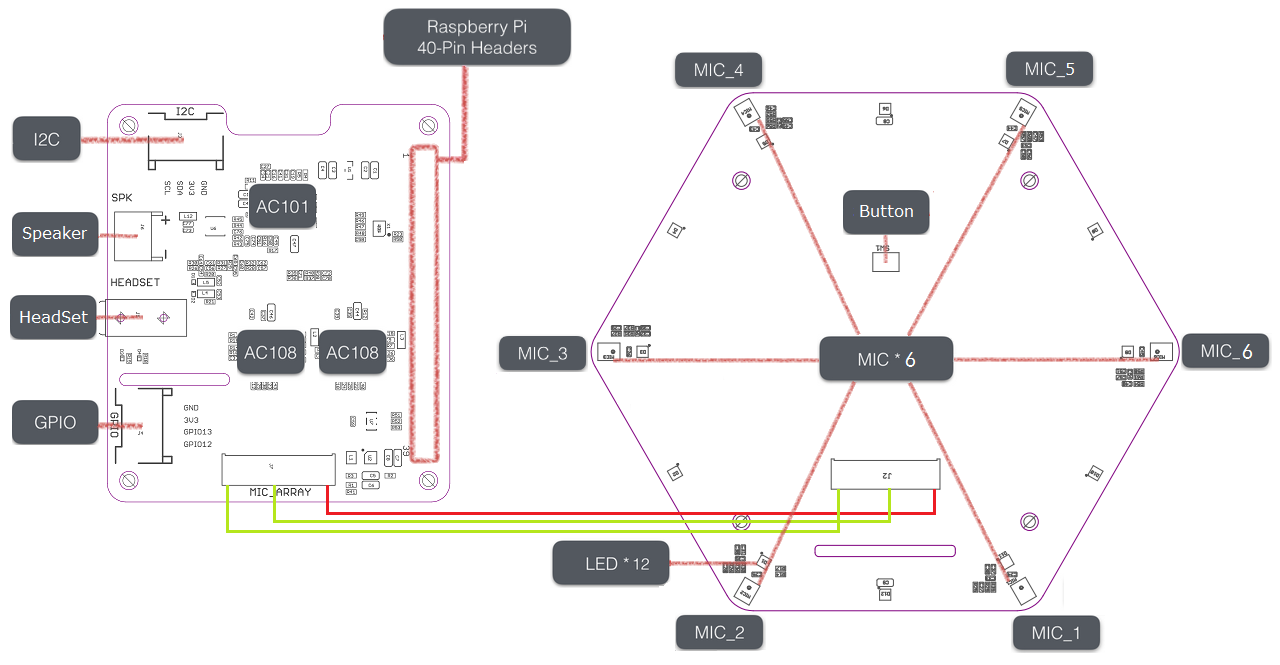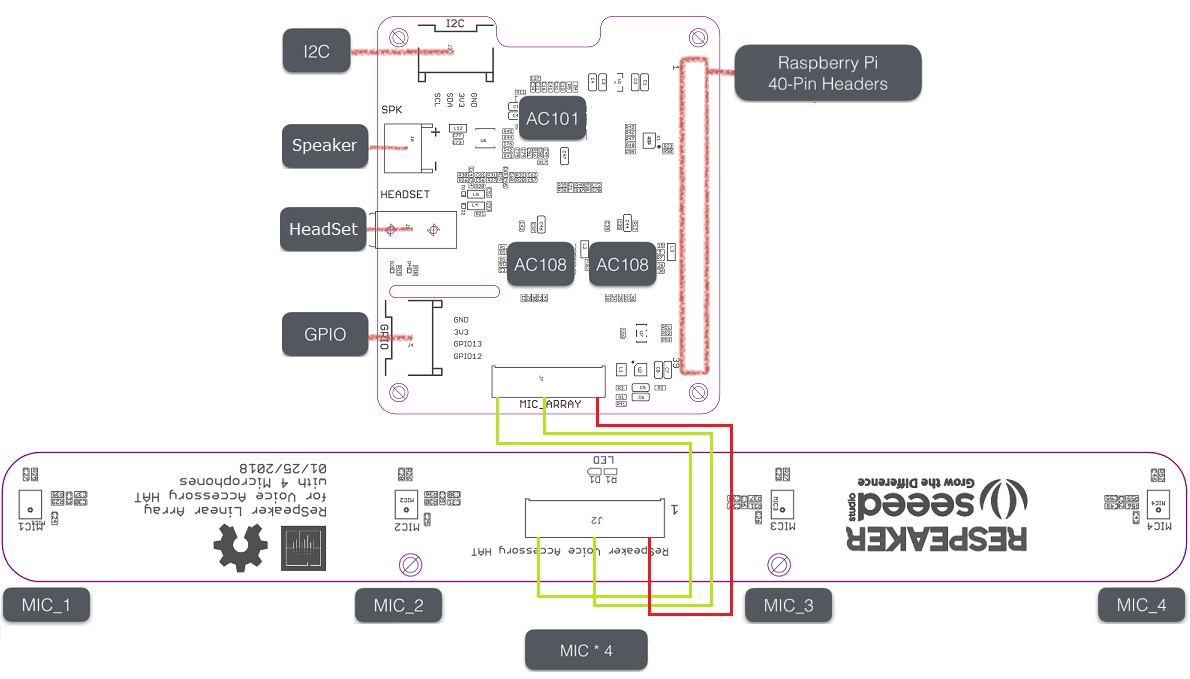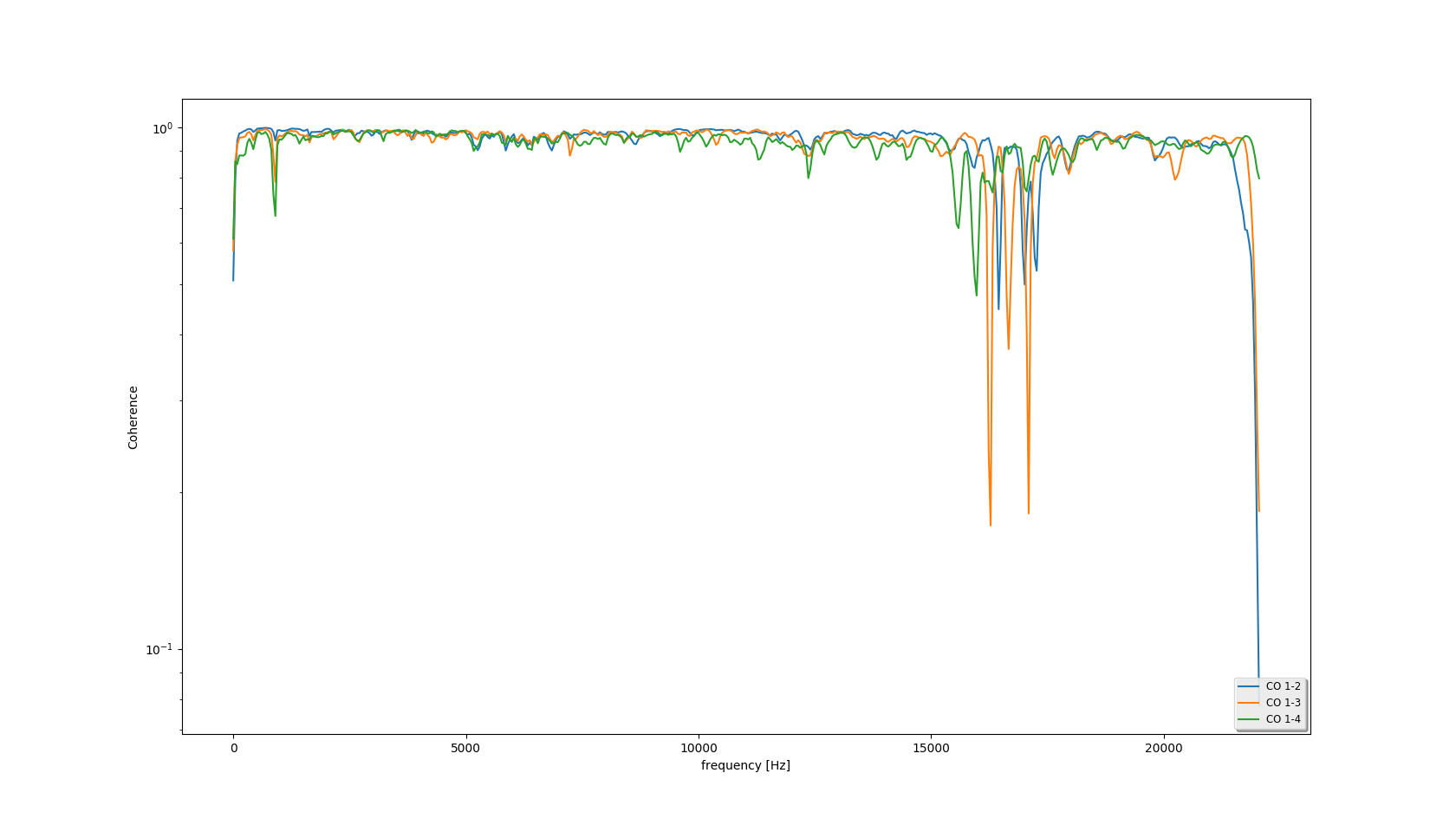269 lines
9.9 KiB
Markdown
269 lines
9.9 KiB
Markdown
# seeed-voicecard
|
||
|
||
[](https://gitter.im/seeed-voicecard/Lobby?utm_source=badge&utm_medium=badge&utm_campaign=pr-badge&utm_content=badge)
|
||
|
||
The drivers of [ReSpeaker Mic Hat](https://www.seeedstudio.com/ReSpeaker-2-Mics-Pi-HAT-p-2874.html),[ReSpeaker 4 Mic Array](https://www.seeedstudio.com/ReSpeaker-4-Mic-Array-for-Raspberry-Pi-p-2941.html),[6-Mics Circular Array Kit](), and [4-Mics Linear Array Kit]() for Raspberry Pi.
|
||
|
||
### Install seeed-voicecard
|
||
Get the seeed voice card source code. and install all linux kernel drivers
|
||
```bash
|
||
git clone https://github.com/respeaker/seeed-voicecard
|
||
cd seeed-voicecard
|
||
#sudo ./install.sh
|
||
sudo ./install.sh --compat-kernel
|
||
sudo reboot
|
||
```
|
||
It may probably happen that the driver won't compile with the latest kernel when raspbian rolls out new patches to the kernel. If so, please try `sudo ./install.sh --compat-kernel` which uses an older kernel but ensures that the driver can work.
|
||
|
||
## ReSpeaker Mic Hat
|
||
|
||
[](https://www.seeedstudio.com/ReSpeaker-2-Mics-Pi-HAT-p-2874.html)
|
||
|
||
While the upstream wm8960 codec is not currently supported by current Pi kernel builds, upstream wm8960 has some bugs, we had fixed it. we must it build manually.
|
||
|
||
Check that the sound card name matches the source code seeed-voicecard.
|
||
|
||
```bash
|
||
#for ReSpeaker 2-mic
|
||
pi@raspberrypi:~/seeed-voicecard $ aplay -l
|
||
**** List of PLAYBACK Hardware Devices ****
|
||
card 0: ALSA [bcm2835 ALSA], device 0: bcm2835 ALSA [bcm2835 ALSA]
|
||
Subdevices: 8/8
|
||
Subdevice #0: subdevice #0
|
||
Subdevice #1: subdevice #1
|
||
Subdevice #2: subdevice #2
|
||
Subdevice #3: subdevice #3
|
||
Subdevice #4: subdevice #4
|
||
Subdevice #5: subdevice #5
|
||
Subdevice #6: subdevice #6
|
||
Subdevice #7: subdevice #7
|
||
card 0: ALSA [bcm2835 ALSA], device 1: bcm2835 ALSA [bcm2835 IEC958/HDMI]
|
||
Subdevices: 1/1
|
||
Subdevice #0: subdevice #0
|
||
card 1: seeed2micvoicec [seeed-2mic-voicecard], device 0: bcm2835-i2s-wm8960-hifi wm8960-hifi-0 []
|
||
Subdevices: 1/1
|
||
Subdevice #0: subdevice #0
|
||
pi@raspberrypi:~/seeed-voicecard $ arecord -l
|
||
**** List of CAPTURE Hardware Devices ****
|
||
card 1: seeed2micvoicec [seeed-2mic-voicecard], device 0: bcm2835-i2s-wm8960-hifi wm8960-hifi-0 []
|
||
Subdevices: 1/1
|
||
Subdevice #0: subdevice #0
|
||
pi@raspberrypi:~/seeed-voicecard $
|
||
```
|
||
If you want to change the alsa settings, You can use `sudo alsactl --file=/etc/voicecard/wm8960_asound.state store` to save it.
|
||
|
||
|
||
|
||
#### Next step
|
||
Go to https://github.com/respeaker/mic_hat to build voice enabled projects with Google Assistant SDK or Alexa Voice Service.
|
||
|
||
## ReSpeaker 4 Mic Array
|
||
|
||
[](https://www.seeedstudio.com/ReSpeaker-4-Mic-Array-for-Raspberry-Pi-p-2941.html)
|
||
|
||
The 4 Mic Array uses ac108 which includes 4 ADCs, we also write ac108 rapberry pi linux kernel driver.
|
||
|
||
Check that the sound card name matches the source code seeed-voicecard.
|
||
|
||
```bash
|
||
#for ReSpeaker 4 Mic Array
|
||
pi@raspberrypi:~ $ arecord -L
|
||
null
|
||
Discard all samples (playback) or generate zero samples (capture)
|
||
playback
|
||
capture
|
||
dmixed
|
||
array
|
||
ac108
|
||
default:CARD=seeed4micvoicec
|
||
seeed-4mic-voicecard,
|
||
Default Audio Device
|
||
sysdefault:CARD=seeed4micvoicec
|
||
seeed-4mic-voicecard,
|
||
Default Audio Device
|
||
dmix:CARD=seeed4micvoicec,DEV=0
|
||
seeed-4mic-voicecard,
|
||
Direct sample mixing device
|
||
dsnoop:CARD=seeed4micvoicec,DEV=0
|
||
seeed-4mic-voicecard,
|
||
Direct sample snooping device
|
||
hw:CARD=seeed4micvoicec,DEV=0
|
||
seeed-4mic-voicecard,
|
||
Direct hardware device without any conversions
|
||
plughw:CARD=seeed4micvoicec,DEV=0
|
||
seeed-4mic-voicecard,
|
||
Hardware device with all software conversions
|
||
pi@raspberrypi:~ $
|
||
```
|
||
If you want to change the alsa settings, You can use `sudo alsactl --file=/etc/voicecard/ac108_asound.state store` to save it.
|
||
|
||
## 6-Mics Circular Array Kit
|
||
|
||
[]()
|
||
|
||
The 6 Mics Circular Array Kit uses ac108 x 2 / ac101 x 1 / micphones x 6, includes 8 ADCs and 2 DACs.
|
||
|
||
The driver is implemented with 8 input channels & 8 output channels.
|
||
>**The first 6 input channel are MIC recording data,
|
||
the rest 2 input channel are echo channel of playback
|
||
The first 2 output channel are playing data, the rest 6 output channel are dummy**
|
||
|
||
|
||
Check that the sound card name matches the source code seeed-voicecard.
|
||
```bash
|
||
#for 6 Mic Circular Array
|
||
pi@raspberrypi:~ $ arecord -L
|
||
null
|
||
Discard all samples (playback) or generate zero samples (capture)
|
||
default
|
||
playback
|
||
dmixed
|
||
ac108
|
||
multiapps
|
||
ac101
|
||
sysdefault:CARD=seeed8micvoicec
|
||
seeed-8mic-voicecard,
|
||
Default Audio Device
|
||
dmix:CARD=seeed8micvoicec,DEV=0
|
||
seeed-8mic-voicecard,
|
||
Direct sample mixing device
|
||
dsnoop:CARD=seeed8micvoicec,DEV=0
|
||
seeed-8mic-voicecard,
|
||
Direct sample snooping device
|
||
hw:CARD=seeed8micvoicec,DEV=0
|
||
seeed-8mic-voicecard,
|
||
Direct hardware device without any conversions
|
||
plughw:CARD=seeed8micvoicec,DEV=0
|
||
seeed-8mic-voicecard,
|
||
Hardware device with all software conversions
|
||
|
||
pi@raspberrypi:~ $ aplay -L
|
||
null
|
||
Discard all samples (playback) or generate zero samples (capture)
|
||
default
|
||
playback
|
||
dmixed
|
||
ac108
|
||
multiapps
|
||
ac101
|
||
sysdefault:CARD=ALSA
|
||
bcm2835 ALSA, bcm2835 ALSA
|
||
Default Audio Device
|
||
dmix:CARD=ALSA,DEV=0
|
||
bcm2835 ALSA, bcm2835 ALSA
|
||
Direct sample mixing device
|
||
dmix:CARD=ALSA,DEV=1
|
||
bcm2835 ALSA, bcm2835 IEC958/HDMI
|
||
Direct sample mixing device
|
||
dsnoop:CARD=ALSA,DEV=0
|
||
bcm2835 ALSA, bcm2835 ALSA
|
||
Direct sample snooping device
|
||
dsnoop:CARD=ALSA,DEV=1
|
||
bcm2835 ALSA, bcm2835 IEC958/HDMI
|
||
Direct sample snooping device
|
||
hw:CARD=ALSA,DEV=0
|
||
bcm2835 ALSA, bcm2835 ALSA
|
||
Direct hardware device without any conversions
|
||
hw:CARD=ALSA,DEV=1
|
||
bcm2835 ALSA, bcm2835 IEC958/HDMI
|
||
Direct hardware device without any conversions
|
||
plughw:CARD=ALSA,DEV=0
|
||
bcm2835 ALSA, bcm2835 ALSA
|
||
Hardware device with all software conversions
|
||
plughw:CARD=ALSA,DEV=1
|
||
bcm2835 ALSA, bcm2835 IEC958/HDMI
|
||
Hardware device with all software conversions
|
||
sysdefault:CARD=seeed8micvoicec
|
||
seeed-8mic-voicecard,
|
||
Default Audio Device
|
||
dmix:CARD=seeed8micvoicec,DEV=0
|
||
seeed-8mic-voicecard,
|
||
Direct sample mixing device
|
||
dsnoop:CARD=seeed8micvoicec,DEV=0
|
||
seeed-8mic-voicecard,
|
||
Direct sample snooping device
|
||
hw:CARD=seeed8micvoicec,DEV=0
|
||
seeed-8mic-voicecard,
|
||
Direct hardware device without any conversions
|
||
plughw:CARD=seeed8micvoicec,DEV=0
|
||
seeed-8mic-voicecard,
|
||
Hardware device with all software conversions
|
||
```
|
||
|
||
## 4-Mics Linear Array Kit
|
||
|
||
[]()
|
||
|
||
In contrast to 6-Mics Circular Array Kit for Raspberry Pi,
|
||
the difference is only first 4 input channels are valid capture data.
|
||
|
||
### Usage:
|
||
```bash
|
||
#for ReSpeaker 2-mic
|
||
#It will capture sound an playback on hw:1
|
||
arecord -f cd -Dhw:1 | aplay -Dhw:1
|
||
```
|
||
|
||
```bash
|
||
#for ReSpeaker 4-mic
|
||
#It will capture sound on AC108 and save as a.wav
|
||
arecord -Dac108 -f S32_LE -r 16000 -c 4 a.wav
|
||
```
|
||
|
||
```bash
|
||
#for 6-Mics Circular Array Kit and 4-Mics Linear Array Kit
|
||
#It will capture sound on AC108 and save as a.wav
|
||
arecord -Dac108 -f S32_LE -r 16000 -c 8 a.wav
|
||
#Take care of that the captured mic audio is on the first 6 channels
|
||
|
||
#It will play a mono channel sound file mono_to_play.wav
|
||
#The file to play must be mono channel or else the speaker output nothing.
|
||
aplay -D plughw:1,0 mono_to_play.wav
|
||
|
||
#Doing capture && playback the same time
|
||
arecord -D hw:1,0 -f S32_LE -r 16000 -c 8 to_be_record.wav &
|
||
#mono_to_play.wav is a mono channel wave file to play
|
||
aplay -D plughw:1,0 -r 16000 mono_to_play.wav
|
||
```
|
||
**Note: Limit for developer using 6-Mics Circular Array Kit(or 4-Mics Linear Array Kit) doing capture & playback the same time:
|
||
1. capture must be start first, or else the capture channels will possibly be disorder.
|
||
2. playback output channels must fill with 8 same channels data or 4 same stereo channels data, or else the speaker or headphone will output nothing possibly.**
|
||
|
||
### Coherence
|
||
|
||
Estimate the magnitude squared coherence using Welch’s method.
|
||

|
||
Note: 'CO 1-2' means the coherence between channel 1 and channel 2.
|
||
|
||
```bash
|
||
# How to get the coherence of the captured audio(a.wav for example).
|
||
sudo apt install python-numpy python-scipy python-matplotlib
|
||
python tools/coherence.py a.wav
|
||
|
||
# Requirement of the input audio file:
|
||
- format: WAV(Microsoft) signed 16-bit PCM
|
||
- channels: >=2
|
||
```
|
||
|
||
### uninstall seeed-voicecard
|
||
If you want to upgrade the driver , you need uninstall the driver first.
|
||
|
||
```
|
||
pi@raspberrypi:~/seeed-voicecard $ sudo ./uninstall.sh
|
||
...
|
||
------------------------------------------------------
|
||
Please reboot your raspberry pi to apply all settings
|
||
Thank you!
|
||
------------------------------------------------------
|
||
```
|
||
|
||
|
||
|
||
|
||
Enjoy !
|
||
|
||
### FAQ
|
||
|
||
When you encounter any installation and use problems when you start your ReSpeaker Pi hat, please use the following image for testing. We have installed seeed-voicecard based on the latest PI image, which can be used by burning it directly on SD. If this still cannot solve your problem, you can ask in the issue. We will try our best to solve your problem.
|
||
|
||
<p style="text-align:center"><a href="https://v2.fangcloud.com/share/7395fd138a1cab496fd4792fe5" target="_blank"><img src="https://github.com/SeeedDocument/Respeaker_V2/raw/master/img/efangyun.png" width="200" height="40" border=0 /></a></p>
|